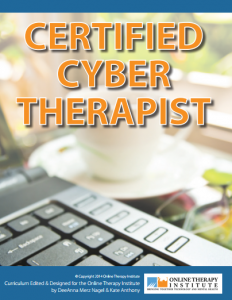 In 1997, I was in the process of completing my second year field placement as a Master of Social Work student. At that time, I remember hearing about email therapy and one day I was talking to one of my peers about it. She was flabbergasted about it and didn’t want it to gain popularity. I remember having several simultaneous thoughts: that it was impersonal and unethical, or that maybe I was being closed minded and hadn’t considered the potential benefits of it and that it would become a lot more common if for no other reason than it being more convenient than driving to an office location.
In 1997, I was in the process of completing my second year field placement as a Master of Social Work student. At that time, I remember hearing about email therapy and one day I was talking to one of my peers about it. She was flabbergasted about it and didn’t want it to gain popularity. I remember having several simultaneous thoughts: that it was impersonal and unethical, or that maybe I was being closed minded and hadn’t considered the potential benefits of it and that it would become a lot more common if for no other reason than it being more convenient than driving to an office location.
Since that time, I have periodically thought about incorporating online services but still didn’t feel completely at ease about it. I continued to have concerns about liability and ethics and also worried that client privacy could be easily compromised. Between 2003 and 2006, I began to do more research and when I made inquiries about it to my professional association it was clear that it was frowned upon and that some of the policies and laws in regards to online therapy were non-existent or ambiguous. I was told that it was imperative to use encryption and to obtain regular professional consultation about how to incorporate online services ethically.
In 2008, I began to have severe health problems that compromised my immune system and along with many other symptoms I was experiencing debilitating fatigue. Once again, I began to contemplate the use of online services because I had a limited adrenaline reserve and thought that if I provided online services I could conserve some physical energy. I could not afford to be on disability and truly did not want to stop working. I learned about the Online Therapy and Coach Institute’s (OTI/OCI) courses, and began to realize that incorporating online services would take some time unless I did it haphazardly. I was not only concerned with the legalities but it was even more important that I could tell my clients that their sessions would be private.
This article first appeared in the Fall 2013 issue of TILT Magazine ~ Therapeutic Innovations in Light of Technology.
Click here to read the entire PDF version of the Online Services – My Evolution article.
Berta Rodrigues is a psychotherapist licensed in the states of NJ and NY. She provides psychotherapy and life coaching in her West Milford, NJ office. She also teaches graduate and undergraduate courses with Rutgers University and has done trainings with Montclair State University’s Child Welfare Training Partnership. For more about Berta see www.heartmight.com.
Access TILT Magazine archives: http://issuu.com/onlinetherapyinstitute/docs


